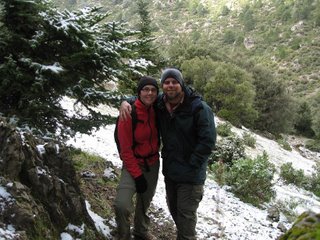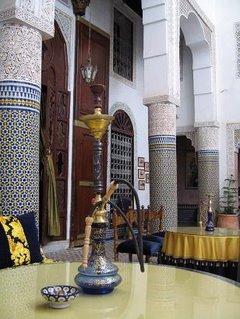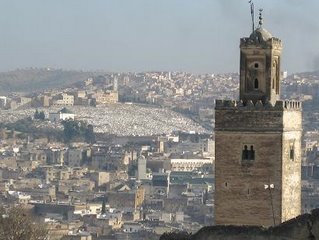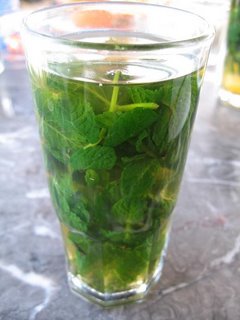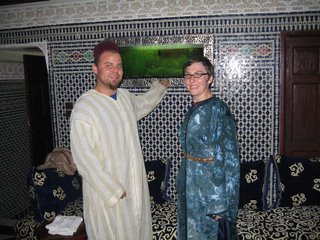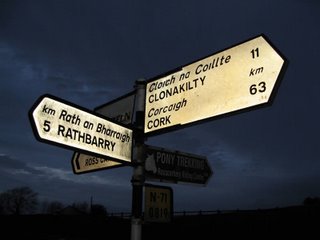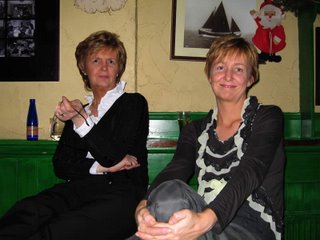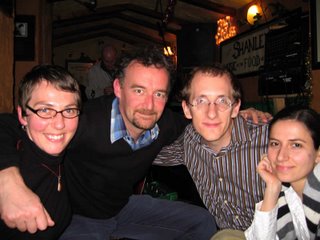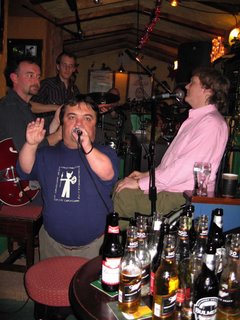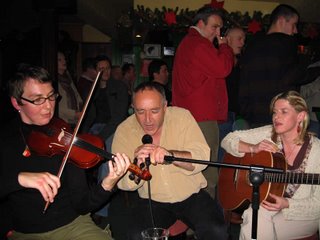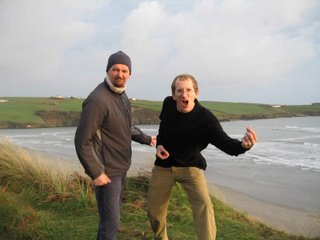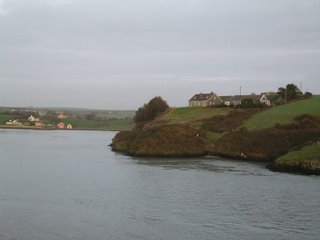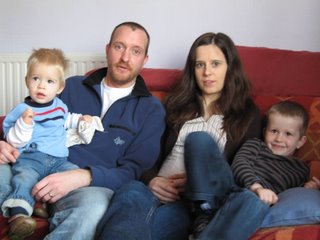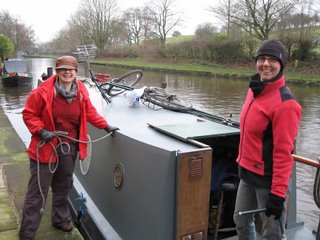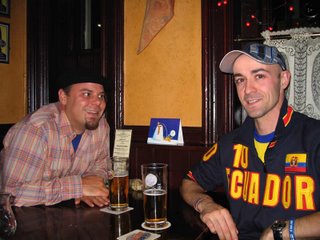When Jason and I signed up for an intensive one week French course in Fes, we opted for "full immersion", by living with a Moroccan family. However, our noble language learning intentions weren't quite fulfilled since most members of the household with which we were placed didn't speak French. Communication in the home was generally in Arabic with spurts of English and a fair amount of gesticulating. Although we weren't immersed in French, we were certainly immersed in Moroccan culture in the Ajana family home, which turned out to be a profoundly educational and rewarding experience.
Our living companions for the week were Mr. Ajana - Abdelkader, or "Hadj", Mrs. Ajana - Fatima or "Hadja", their two youngest sons Brahim and Mohammed, a family friend, Kaya, from the USA with her four year old daughter Jazmyne, and two domestic employees, Hessna and Zoah, as well as a constant stream of visitors who proved impossible to keep track of.
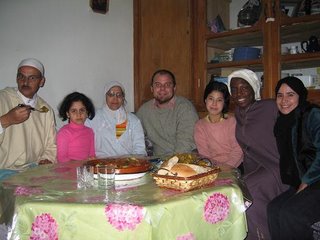
Left to right: Hadj, Kensa (granddaughter), Hadja, Jason, Zoah, Kaya and Hessna.
We got a meaty dose of traditional Moroccan family life in this colorful, non-stop household. In fact, with hectic comings and goings, bursts of shouting and a rich cast of characters, we reckon the Ajana home would be a strong contender for the next series of "Big Brother".
The family home was buried in indistinguishable blind alleys, close to both the bustling Talaa Kebira street and a smelly tannery. The low-key doorway revealed nothing of the large, elegant home inside. Our bedroom had been converted from one of three elaborate reception rooms, so we were surrounded by mosaic tiling and stone work - quite a grand boudouir. On arrival, we were ushered upstairs to the family room and immediately encouraged to tuck into a feast of olives, home made bread, cookies and almond sweets, accompanied, of course, by sweet mint tea. We quickly found our feet within the household after discovering the golden rule: just keep eating. As in many cultures, food is the universal language of hospitality here. Often we barely had chance to digest our last meal before another spread appeared, all beautifully prepared with incredibly fresh ingredients.
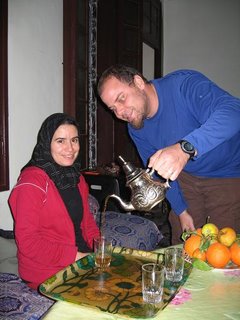
Jason pours tea for Hessna the Moroccan way.
The Ajanas seemed to enjoy having us around and even gave us nicknames. Jason was Tehj (Royal Crown) and I was Behia (extraordinary). Hadj (Mr Ajana) made it his personal mission to make sure we had a great experience in his home. During our stay he had three separate meetings with the King of Morocco, which he played down tremendously. In betwen royal engagements he found time to escort us to school on the bus, dress us up in local attire and teach us how to make lamb tagine with prunes and almonds - our favorite Moroccan dish. Hadj was a wonderful host and a great ambassador for Fes.
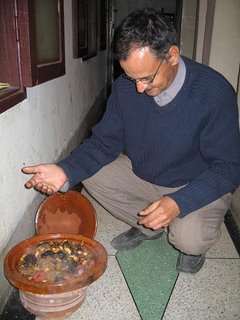
Cooking demo: Hadj unveils the lamb tagine.
Hadja's (Mrs Ajana) approach to hospitality was just as warm, if heavily focused on getting us to "ish" (eat). When Hadja came down with a bad cold, I observed the women of the home rallying round her, bringing tea and kleenex, giving footrubs, massages and lots of TLC. Although I gave Hadja plenty of sympathy, I didn't quite manage the foot rubbing which may have been a terrible faux pas, possibly rendering me an awful house guest. Fortunately, Hadja's daughter did send her own domestic employee, Zoah (aged 13) to help out until Hadja felt better.
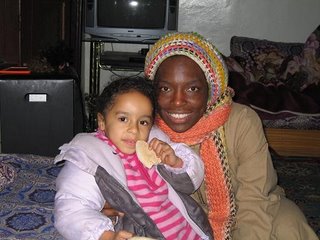 Kaya (house guest and honorary family massage therapist) with her daughter Jazmyne.
Kaya (house guest and honorary family massage therapist) with her daughter Jazmyne.
Hadj and Hadja's youngest sons, Brahim and Mohammed, were clearly of the future generation, with attitudes, attire, lifestyles and aspirations comparable to those of young people in Europe or the USA. Brahim is currently studying towards his second degree and will soon be faced with the difficult choice of staying close to his parents in traditional Fes or moving abroad (he has siblings in three foreign countries).
One particularly interesting member of the household was Hessna - the Ajanas' 22 year old domestic employee. I found myself fascinated by and drawn to Hessna, this great character full of contradictions. Her role was to serve in the home, yet she would express herself assertively in conversations with Hadj and Hadja, often getting the last word. Hessna is almost illiterate in Arabic, althouth she has aquired a decent vocabulary of French and English words and communicated with us extremely well. Clearly she is confident and bright, yet she spends her days baking bread, pouring tea, making tagines and chatting with family members (although shouting seems popular here, and she excels at it). I don't know how Hessna came to be involved with the Ajana family, if she sees herself as distinct from the family or whether she has any aspirations beyond working in their home. Had we stayed longer I would have asked her these and many other questions - good conversation topics for the 'hammam' (public steam baths). Hessna and I found common ground in spite of the difference between our cultures and lives. I can't help wondering what Hessna's life would be like if she had the same education & career opportunities as me.
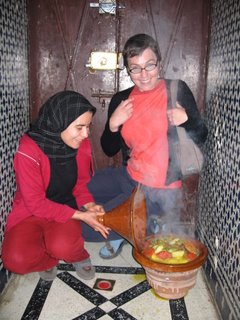 Hessna shows me a steaming tagine.
Hessna shows me a steaming tagine.We are extremely grateful to the Ajana family for opening their home and their hearts to us. They gave us a unique opportunity to experience Moroccan family life from within, and our time with them was truly unforgettable.
*********************************************************
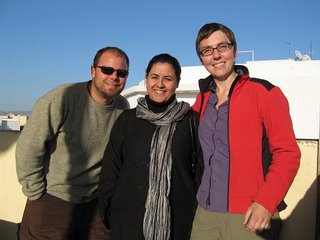
When not slurping tea, cooking tagine or watching Moroccan soap operas with the Ajana family, we happily spent our days with Hanane, our trusted French/Arabic teacher.

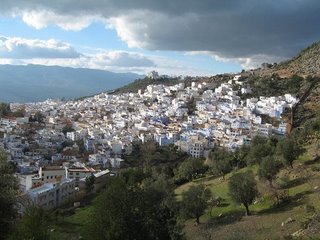

 The skies and climate are constantly changing in the Rif, from sunny and blue one minute, to dark, gray and wet the next.
The skies and climate are constantly changing in the Rif, from sunny and blue one minute, to dark, gray and wet the next.